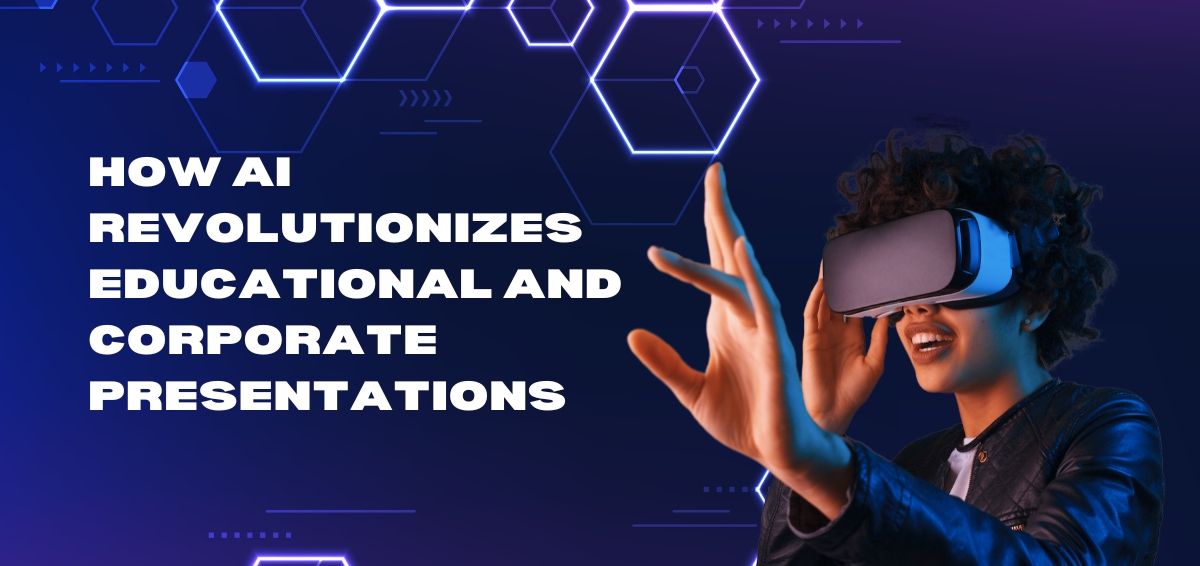
How AI Revolutionizes Educational and Corporate Presentations
In a world where technology is rapidly advancing, AI Presentation Makers have emerged as a game-changer in various industries. One significant arena where AI is making a profound impact is in educational and corporate presentations. The fusion of AI and presentations is not merely a technological trend; it’s a paradigm shift that is reshaping the way information is conveyed and absorbed. In this blog post, we delve into the ways AI supports and enhances both educational and corporate presentations.
The Rise of AI in Presentations
1. Dynamic Content Creation:
Traditional presentations often involve static slides and scripted content. AI injects dynamism into this static landscape by facilitating dynamic content creation. AI-driven tools, such as natural language processing (NLP) and machine learning algorithms, can analyze vast amounts of data to generate compelling and relevant content. This results in presentations that are not only informative but also adapt to the audience’s needs in real time.
2. Personalized Learning Experiences:
AI enables the creation of personalized learning experiences in educational presentations. Through data analysis, AI can identify individual learning preferences and tailor content to suit diverse learning styles. This personalized approach fosters a more engaging and effective learning environment, catering to the unique needs of each learner.
3. Enhanced Interactivity:
One of the key advantages of incorporating AI into presentations is the ability to enhance interactivity. AI-powered chatbots and virtual assistants can engage with the audience, answer questions, and provide additional information in real time. This interactivity not only keeps the audience engaged but also creates a more dynamic and participatory presentation experience.
AI in Educational Presentations
1. Intelligent Tutoring Systems:
AI is transforming the role of educators with the introduction of Intelligent Tutoring Systems (ITS). These systems use AI algorithms to assess individual student performance, identify learning gaps, and provide targeted feedback. In educational presentations, ITS can be seamlessly integrated to offer personalized learning paths, ensuring that each student receives the support they need to excel.
2. Gamification for Engagement:
AI-driven gamification elements add an extra layer of engagement to educational presentations. By incorporating game-like features such as quizzes, challenges, and rewards, educators can create a more immersive learning experience. This not only captures students’ attention but also makes the learning process enjoyable and memorable.
3. Automated Assessment and Feedback:
Grading assignments and providing timely feedback can be a time-consuming task for educators. AI streamlines this process by automating the assessment of assignments and delivering instant feedback. This allows educators to focus more on teaching and mentoring, fostering a more efficient and supportive learning environment.
AI in Corporate Presentations
1. Data-Driven Insights:
In the corporate world, data is king. AI analyzes vast amounts of data to extract valuable insights that can be incorporated into presentations. Whether it’s market trends, customer behavior, or financial forecasts, AI provides real-time data-driven insights, empowering presenters to make informed decisions and deliver compelling messages.
2. Speech Recognition for Seamless Communication:
AI-powered speech recognition technology ensures seamless communication in corporate presentations. This technology transcribes spoken words into text, making presentations more accessible and inclusive. Additionally, speech recognition enables the automation of tasks such as transcribing meeting minutes, saving valuable time for professionals.
3. Virtual Collaboration Tools:
The global nature of business demands effective virtual collaboration. AI facilitates this through virtual collaboration tools that enhance communication and teamwork. From intelligent chatbots that assist in project management to virtual whiteboards that encourage brainstorming, AI-driven tools foster a collaborative and efficient work environment.
Overcoming Challenges with AI
While the integration of AI into presentations brings numerous benefits, it is essential to address potential challenges. Privacy concerns, ethical considerations, and the need for comprehensive training on AI tools are aspects that organizations and educational institutions must navigate to ensure a responsible and effective use of AI in presentations.
Conclusion
The marriage of AI and presentations represents a transformative leap forward in education and corporate communication. From personalized learning experiences to data-driven insights, AI enriches presentations, making them more engaging, interactive, and impactful. As we embrace the era of AI, the key lies in harnessing its power responsibly to unlock the full potential of educational and corporate presentations. The future of presentations is here, and it’s intelligent, dynamic, and powered by artificial intelligence.





Leave Your Comment